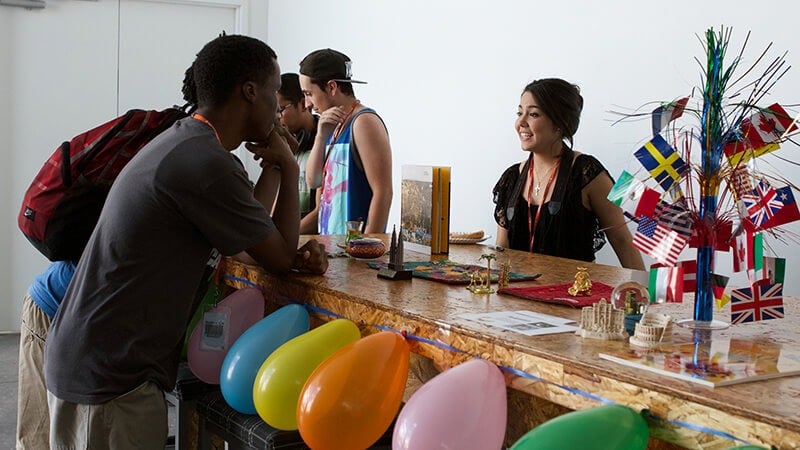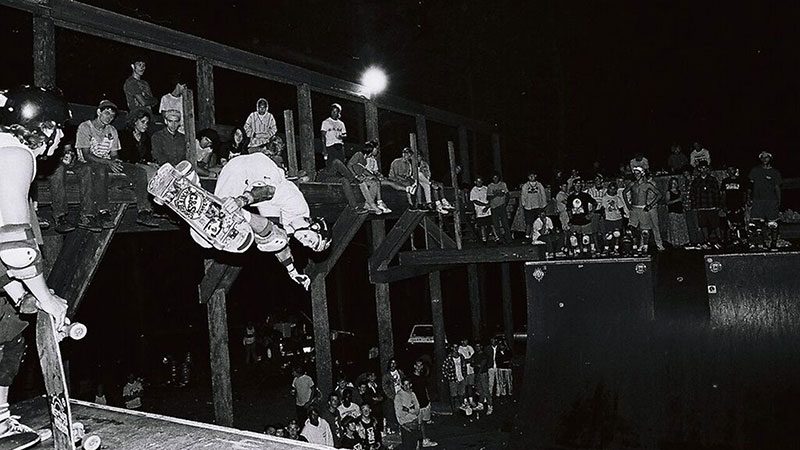How To
Thinking About Starting a Podcast? Here are Some Do's and Don'ts
No matter what you're interested in, there's a good chance that someone somewhere is podcasting about it. Last year, Apple announced that the iTunes Store had passed the one billion mark in podcast subscriptions, and the numbers continue to rise. A recent Connect poll revealed that Full Sail students are all about podcasts. 21% of respondents said they produce their own, while 51% frequently turn to podcasts as a source of information and entertainment.
Thinking about starting your own podcast? We talked with Film grad Ariel Paredes, co-host of the gaming and culture podcast The Warp Pipe, and Associate Course Director in English John King, host of The Drunken Odyssey: A Podcast About the Writing Life, to find out their best tips for producing a professional sounding podcast.
Do find an angle.
An iTunes search for podcasts about video games turns up hundreds of results. This doesn’t mean that no one is allowed to talk about video games on a podcast ever again, but in order to give yourself an edge in the market, you’re going to need to find an angle—a unique lens through which to present your material. For Ariel, the angle was topical diversity.
“Almost every podcast I found was centralized on a specific topic, which is a great idea as it focuses on one demographic. But I hated having to listen to multiple podcasts to get what I wanted,” he says. “I wanted a podcast where I could tune in and listen to the latest news in not just video games, and not just movies, but a culmination of both, as well as other media. Thus, The Warp Pipe was born.”
John’s start in podcasting was a little more auspicious.
“The faculty multimedia center at the university where I taught had a sound booth. It called to me,” he says. “Also, I wanted to keep having the conversations about writing that I had enjoyed while earning my MFA. It occurred to me that with a podcast I could foster a global writing community of guests and listeners, beginning with the network of people I already knew, and keep those conversations going.”
Don’t underestimate the power of consistency.
Once you’ve settled on content, it’s important to decide when and how often you’re going to post. Is your podcast going to be weekly? Bi-weekly? Will it post on Wednesdays or a weekend? If you build a reputation for consistency, you’ll be taken more seriously and establish something for your listeners to look forward to. Deadlines will also help you prioritize when it comes to time management. If your audience knows that your podcast posts every Monday at noon, you’ll be less likely to procrastinate chasing down that integral interview or finishing a final bit of editing.
John agrees that reliability is key. “Even if your content is good, your audience will stop looking forward to your show if your releases are random. Be sure you are ready for that commitment. Many podcasters quit after about two months because a good show is a lot of work, even if the technology enables you to sound really professional. Following through is just as important as sounding good and having quality content.” John estimates that he spends between 10-15 hours a week producing The Drunken Odyssey, not including research.
Do record in your bedroom.
Fact: the more stuff a room contains, the less it will echo. Large, hard surfaces like tables and bare walls will cause sound to bounce around, and be almost impossible to fix in post-production. Find a place to record that’s quiet, carpeted, and full of soft things like curtains and upholstered furniture.
Don’t sweat your equipment specs too much, especially in the beginning.
Don’t let a lack of fancy equipment hold you back. Ariel says the most important piece of advice he can pass on to someone starting their own podcast is to simply start recording.
“We recorded [early episodes] by huddling around the laptop and leaning into the built-in microphone,” he says. It wasn’t until the podcast built up a following that he decided to invest in a better microphone. “Now, we still huddle around the microphone, but with a lot less back pain,” he laughs.
When you’re ready, any directional microphone will capture your voice while filtering out ambient noise.
If your podcast includes interviews, you won’t always be able to dictate your location, and this is where a good recording rig comes in handy.
“I often record at the secret headquarters of The Drunken Odyssey, but I have also recorded in the field, at Miami Book Fair International, at the Kerouac House here in Orlando, and in a hotel room in a Boston skyscraper,” says John. “On the road, I use two dynamic microphones, a portable mixer, and record out to a Zoom digital recorder.”
Using a pop filter will cut down on the annoying pops and ticks that occur when pronouncing certain words. In a pinch, you can make your own pop filter using panty hose and a wire hanger.
Do keep it conversational.
“I prefer in-person interviews, both because the recording is warmer, but also because the interview feels more social,” says John. He suggests doing a fair amount of research on guests before you interview them. This will allow you to direct the flow of conversation through follow up questions. “Be curious,” he says.
Ariel and his three co-hosts have been friends for years, and listeners respond to their natural ease. “Our demographic (us included) are all children of the internet age.” He says it’s important to know your audience and approach topics in a way that’s familiar to potential listeners.
Don’t be afraid to include your audience.
One way to encourage audience retention and growth is to include an interactive component such as a Q&A or mailbag segment. This will allow the audience to feel like you’re talking with them rather than at them.
Do edit your podcast to achieve a more professional product.
We’re all guilty of using filler syllables like “um” or “like” in our normal speech patterns. These words, known in linguistics as filler, serve a purpose. They give our brains time to catch up with our thoughts. Too many of them, however, can make for a stilted podcast. Thankfully, these words are easy to locate and delete in most sound editing programs.
If your podcast contains multiple segments, you might consider breaking them up with music or a pre-recorded announcement that signifies to the listener your intention to switch gears.
When you’re ready to export your podcast to Mp3 format, consider the content to determine the most efficient bitrate. If your podcast includes a lot of music, export it at a higher bitrate (192-128kbps) to maintain quality. If your podcast is purely conversational, you can set your bitrate lower (96-64kbps) to save bandwidth and enable easier streaming.
Don’t beat yourself up over mistakes.
Look, you’re going to mess up. That’s part of learning something new.
“All my mistakes were technological,” says John. “I didn’t have an audio production background before I started this, unless making mix-tapes counts.”
And because this is the Internet, people are likely going to point your mistakes out to you. That’s okay. The important thing is to move forward. Constructive criticism can help you take your podcast to the next level. And what about the other kind of criticism? The not-so-constructive kind? Ignore it, says Ariel.
“A piece of advice I received from a friend and listener that really helped me push through was, ‘If they’re focusing on your mistakes, they’re not really listening to what you have to say.’ That helped me immensely and we go into every recording with that in mind.”
Whether you’re ready to apply or just want to learn more about Full Sail University, our Admissions Representatives are here to help. Call us or request more information.
Keep Exploring
- Simulation & Visualization
- Facilities
- All Access
- Media & Communications
- Our Grads
- Digital Marketing
- Infographic
- Music Business
- New Media Journalism
- Course Stacks
- Scholarships
- I Made This
- Graphic Design
- Business Intelligence
- Emerging Technologies
- Warped Tour
- Expert Advice
- Student Organizations
- Degree Info
- Creative Writing
- Film

